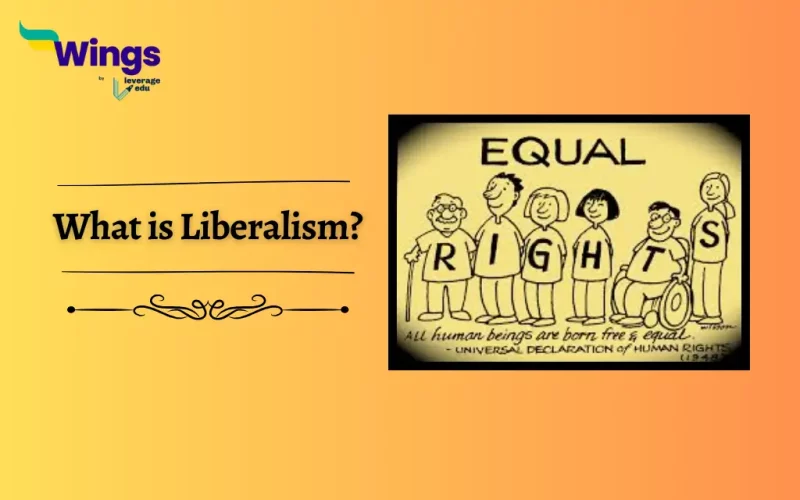Hey, guys! Mr. Owl this side. I see that you want to know about ‘Liberalism.’ Hootfully, I’ll be of help to you! Since we owls are very wise. If you scroll further down this blog, you’ll understand and get to know all the information you will need of what is Liberalism!
Table of Contents
What is Liberal Ideology?
Liberalism is a political ideology that values personal freedom, equality, and the rule of law. It promotes limited government intervention and supports a free-market economy, hence aiming to create a society where people can pursue their aspirations and live harmoniously.
Imagine a marketplace of ideas filled with diverse viewpoints, like a bustling bazaar filled with different stalls. There are stalls representing different viewpoints, and liberalism encourages open dialogue and debate to reach the best solutions for our society.
Must Read: What Is Nationalism? Definition, History, and Significance
What are Liberal Values, Ideas, and Beliefs?
Moreover, Liberalism upholds several core values, such as freedom of speech, expression, as well as religion.
1. Social Justice: Think of it as levelling the playing field. Liberal ideology seeks to create a fair and just society where everyone has equal opportunities.
2. Individual Rights: Liberals champion individual rights and autonomy, hence making sure that people can make choices without undue interference.
3. Welfare State: Liberal political views often advocate for a welfare state that provides safety nets for those in need. Consequently, much like a potluck where everyone contributes to ensure that all guests have enough to eat and enjoy the gathering.
4. Limited Government: Liberals advocate for a limited government which means that the state’s intervention in citizens’ lives should be minimised, thus allowing individuals and private enterprises to flourish.
5. Free Market: Liberalism believes in a free market economy in which prices and outputs are determined by the supply and demand for goods and services. Additionally, this system encourages competition as well as economic growth.
Did You Know? John Locke is the father of Liberalism.
History of Liberalism
Liberalism’s roots can be traced back to the Enlightenment era in the 17th and 18th centuries when thinkers like John Locke and Adam Smith emphasised the importance of individual rights and free markets. Since then, liberalism has had an important role in shaping democratic institutions and human rights movements.
Furthermore, it was crucial to the French and American Revolutions, which helped to create the modern democratic societies we know today.
Also Read: Revolutions in India You Must Know!
Significance of Liberalism
Liberalism is an ideology that cherishes individual liberties, equality, and limited government intervention. It values diverse opinions and seeks to build a fair and just society.
By understanding liberal political views, we can actively engage in conversations that lead to a more inclusive and democratic society.
Also Read: Arab Nationalism: Rise, Fall and Objective
What are Liberalism Theories?
Moreover, the following are some different liberal theories and their original proponents that will help you:
What is Classical Liberalism?
Proponent: John Locke
Idea: Emphasises individual rights, limited government, and the rule of law.
Proponent: John Stuart Mill
Idea: Focuses on individual liberty, but also advocates for government intervention to promote social welfare and reduce inequalities.
What is Neoliberalism?
Proponents: Friedrich Hayek, Milton Friedman
Idea: Advocates for free-market capitalism, deregulation, as well as limited government intervention in the economy.
What is Utilitarianism?
Proponent: Jeremy Bentham
Idea: Promotes policies that maximise overall happiness and well-being in society.
What is Libertarianism?
Proponents: Robert Nozick, Ayn Rand
Idea: Advocates for minimal government involvement, strong property rights, and absolute individual liberty.
What is Rawlsian Liberalism? (Justice as Fairness)
Proponent: John Rawls
Idea: Focuses on creating a just and fair society through the principles of justice, including the difference principle and the veil of ignorance.
What is Green Liberalism?
Proponent: Various
Idea: Combines liberal values with environmental concerns, advocating for sustainability and ecological responsibility.
Also Read: Who Wrote the Constitution of India?
Who Introduced Liberalism in India?
Raja Ram Mohan Roy was an Indian social reformer and intellectual who advocated for liberal principles such as freedom of speech, religious tolerance, and women’s rights. Additionally, he had an important part in challenging conservative practices and promoting liberal ideas in Indian society. Raja Ram Mohan Roy is also usually referred to as the “Father of the Indian Renaissance.”
What is an Example of Liberalism?
An example of liberalism, moreover in India can be seen in our Constitution, which was adopted in 1950. The Indian Constitution embodies several liberal principles that reflect a commitment to individual rights, democracy, and the rule of law. Furthermore, our Fundamental Rights, Democracy, Secularism, Social Justice and Judicial Independence all are features of Liberalism.
Quiz Time!
Results
#1. Who is the founder of liberalism?
#2. Liberalism is based upon freedom of what?
#3. Which one of the following is a liberal value?
“Kiddos, I’ve answered all your queries with the utmost precision that I was capable of. Now, I’ll be taking my leave, but if you think I might have missed something, do check out the FAQ section or drop a comment. I always respond!”
FAQs
The core principle of liberalism is individual liberty, emphasizing personal freedom and rights.
John Locke is the father of Liberal theory.
Liberalism tends to support progressive social change, individual rights, and government intervention, while conservatism leans towards tradition, limited government, and traditional values.
Yes, liberalism can take on different forms and priorities in different countries based on cultural, historical, and political contexts.
RELATED BLOGS
Lastly, we hope you liked our blog and gained an understanding of what is Liberalism. Moreover, you may even read more blogs and empower yourself with knowledge regarding Civics and Polity!
 One app for all your study abroad needs
One app for all your study abroad needs
















